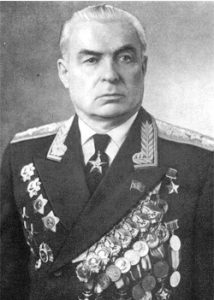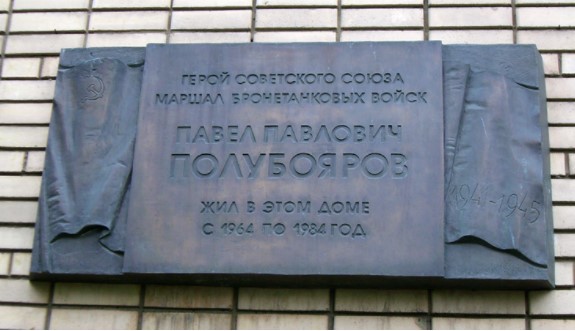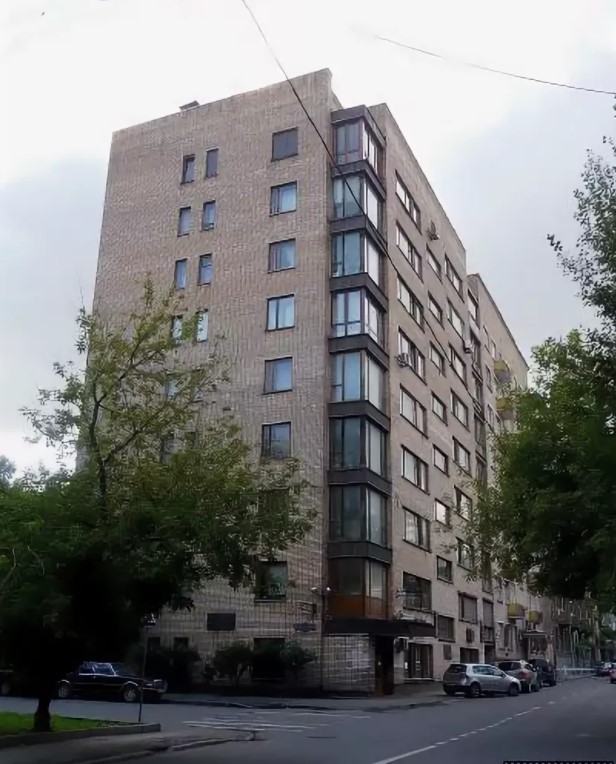Pavel Pavlovich
Poluboyarov
1901-1984

Pavel Pavlovich Poluboyarov was commander of the 4th Guards Kantemirovsky Order of Lenin of the Red Banner Tank Corps of the 1st Ukrainian Front, Guard Lieutenant General of tank troops. He was born on June 3 (16), 1901 in the city of Tula in the family of a handicraftsman. He graduated from the city college. He worked as an accountant, then as a handyman at one of the factories in Tula. In 1917-1918 he was a member of the board and head of labor squads in the city of Tula. In November 1919 he voluntarily joined the Red Army. In 1920 he graduated from the Tula Infantry Command courses and in the same year – the School of High Command of armored units. From October 1920 to October 1922, he was commander of a heavy tank as part of the 6th separate tank-armored detachment. He was participant in the suppression of uprisings in the Southern Urals. He was one of the first armored tank commanders. He was member of the RCP(b)/CPSU(b)/CPSU since 1920. From October 1922 to September 1926, he studied at the Military Armored School in Petrograd (Leningrad), from September 1926 to October 1927 he was platoon commander in the 3rd automobile regiment in the city of Kharkov, from October 1927 to December 1929 – commander of the training platoon of armored vehicles of the 12th armored division in the city of Berdichev; from December 1929 to April 1931 – commander of the armored division in the 45th Rifle Division in the city of Kiev. From April to November 1931, he studied at courses in the city of Kazan. From November 1931 to May 1932, he was Chief of staff of the training tank regiment in the city of Kiev. From May 1932 to November 1934, he was at the headquarters of the Ukrainian Military District: assistant to the head of the sector of combat training of armored troops, head of the 1st sector of armored troops. From November 1934 to November 1938, he attended the Military Academy of Mechanization and Motorization of the Red Army named after I.V. Stalin. From November 1938 to June 1940, he was the head of the armored forces of the Trans–Baikal Military District. Participant of the battles on the Khalkhin-Gol River in 1939. From June 1940 to January 1941, he was Deputy Commander of the 17th Army of the Trans-Baikal Military District, simultaneously from November 1940 to January 1941 – studied at the Advanced Training Courses of the higher commanding staff at the Academy of the General Staff of the Red Army. From January to March 1941, he was Head of the armored car department of the Leningrad Military District, from March to June 1941 – Head of the armored car department of the Baltic Special Military District. He had been participant of the Great Patriotic War since June 1941. From June 1941 to March 1942, he was Head of the armored forces of the North-Western Front, from March to August 1942 – Deputy commander of the Kalinin Front for tank troops. On August 7, 1942, at his personal request, he was appointed commander of the 17th Tank Corps, which became part of the Voronezh and then the Southwestern Fronts. The tankers of this corps resolutely repelled all the blows of the Fascist troops, drained the selected enemy units and defended Voronezh together with other formations. In December 1942, the corps under the command of P.P. Poluboyarov participated in the offensive of our troops on the Middle Don (the Srednedon offensive operation) and was particularly successful at the junction of two fronts, made a breakthrough into the enemy’s rear and struck at the urban-type settlement of Kantemirovka. The village and the railway station were liberated from the Nazis on December 19, 1942 by a strike of tank brigades from three sides simultaneously. The enemy was especially stunned by the blow from the rear. Our tankers blocked the railway track along which the fascists were pulling up reserves. It was a victory. For this feat, the corps received the honorary name «Kantemirovsky», and on January 27, 1943, it was renamed the 4th Guards Kantemirovsky Tank Corps. In July 1943 the corps of General P.P. Poluboyarov participated as part of the 27th Army of the Steppe (since July Voronezh) Front in the battle of the Orel-Kursk Bulge. Acting in the Belgorod-Kharkov direction, he liberated cities and villages of Ukraine. From December 1943 to January 14, 1944, the corps as part of the 60th Army of the 1st Ukrainian Front participated in the Zhytomyr-Berdichev operation, in 1944-1945 – in Proskurov-Chernivtsi (March 4 – April 17, 1944), Lviv-Sandomierz (July 13 – August 29, 1944), Carpathian-Duklin (September 8 – October 28, 1944), Sandomierz-Silesian (January 12 – February 3, 1945), Lower Silesian (February 8-24, 1945), Upper Silesian (March 15-31, 1945) offensive operations. For the capture of the city of Ternopil, the corps was awarded the Order of the Red Banner. Semi-Boyar tankers fought on the Sandomierz bridgehead, participating in the liberation of Poland. For the successful operation to liberate the city of Krakow, the corps was awarded the Order of Lenin. The commander of the 4th Guards Kantemirovsky Tank Corps of the Guards, Lieutenant General P.P. Poluboyarov distinguished himself with his tankers in the Berlin (April 16 – May 8, 1945) and Prague (May 6-11, 1945) offensive operations. For successful combat operations, the corps was noted 17 times in the orders of the Supreme Commander-in-Chief. By the decree of the Presidium of the Supreme Soviet of the USSR dated May 29, 1945, Lieutenant General Pavel Pavlovich Poluboyarov was awarded the title of Hero of the Soviet Union with the award of the Order of Lenin and the Gold Star medal for the skillful management of the corps units during the capture of the city of Dresden and the courage and heroism shown at the same time.
Address: Moscow, Sivtsev Vrazhek lane, 31/13

